Презентация supply and demand botanov

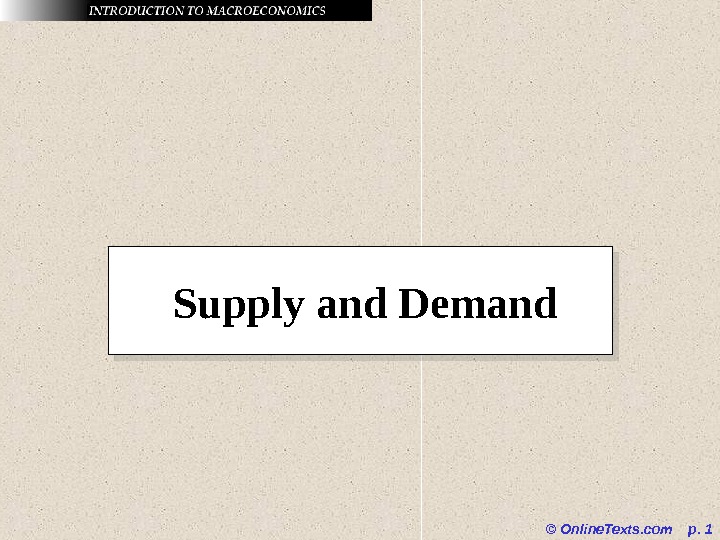

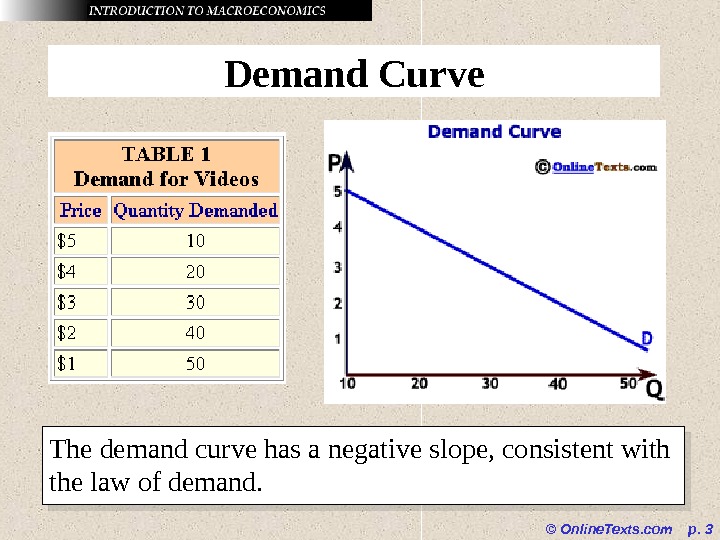


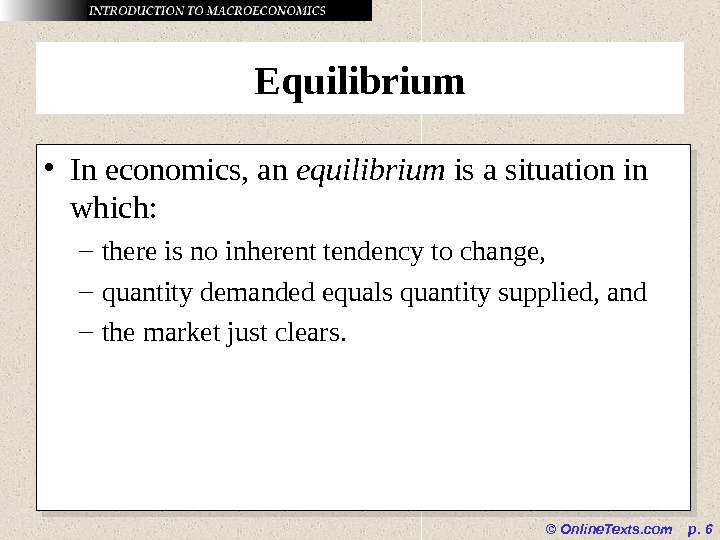



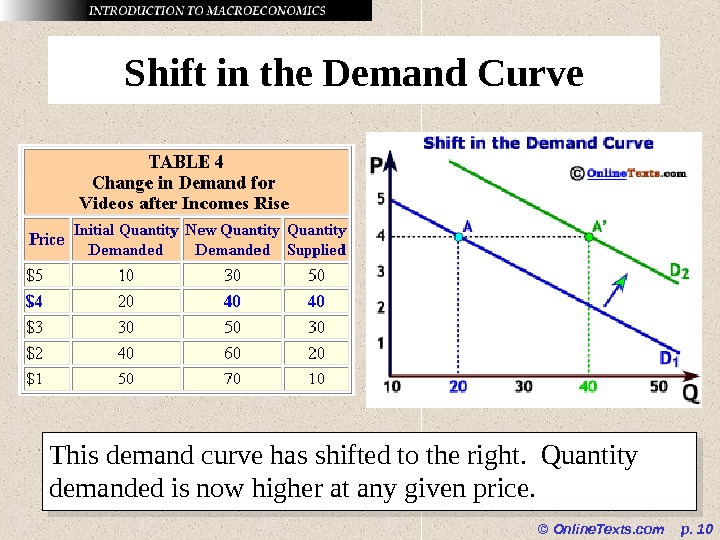





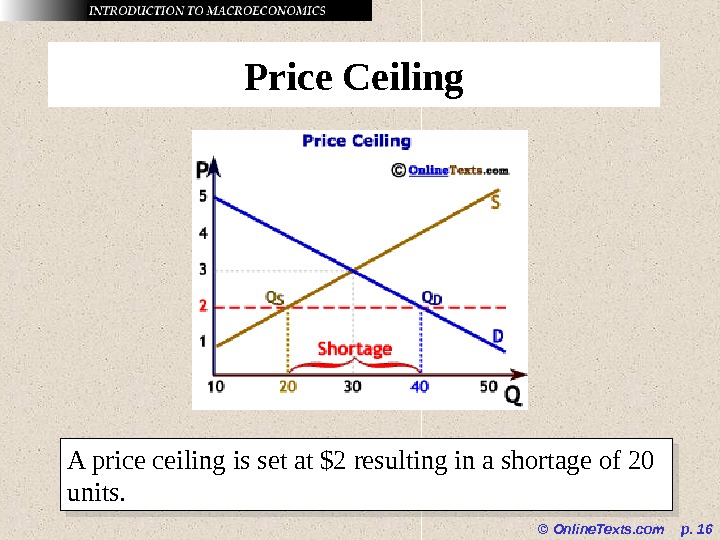
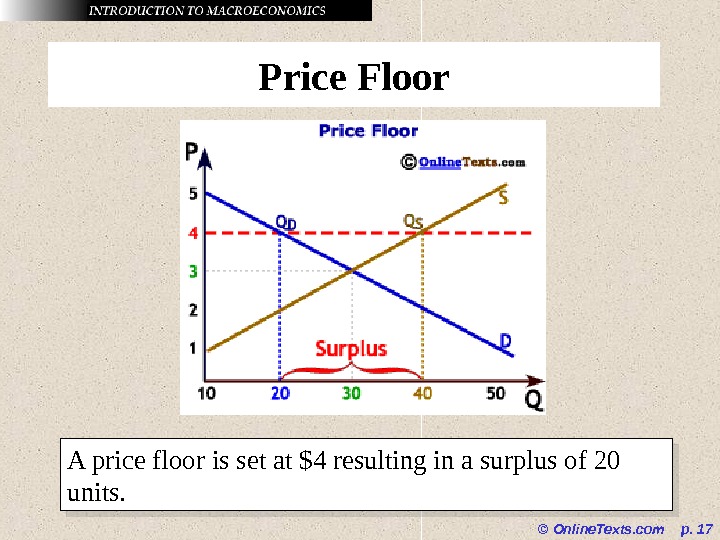
- Размер: 490.5 Кб
- Количество слайдов: 17
Описание презентации Презентация supply and demand botanov по слайдам
 © Online. Texts. com p. 1 Supply and Demand
© Online. Texts. com p. 1 Supply and Demand
 © Online. Texts. com p. 2 The Law of Demand • The law of demand holds that other things equal, as the price of a good or service rises, its quantity demanded falls. – The reverse is also true: as the price of a good or service falls, its quantity demanded increases.
© Online. Texts. com p. 2 The Law of Demand • The law of demand holds that other things equal, as the price of a good or service rises, its quantity demanded falls. – The reverse is also true: as the price of a good or service falls, its quantity demanded increases.
 © Online. Texts. com p. 3 Demand Curve The demand curve has a negative slope, consistent with the law of demand.
© Online. Texts. com p. 3 Demand Curve The demand curve has a negative slope, consistent with the law of demand.
 © Online. Texts. com p. 4 The Law of Supply • The law of supply holds that other things equal, as the price of a good rises, its quantity supplied will rise, and vice versa. • Why do producers produce more output when prices rise? – They seek higher profits – They can cover higher marginal costs of production
© Online. Texts. com p. 4 The Law of Supply • The law of supply holds that other things equal, as the price of a good rises, its quantity supplied will rise, and vice versa. • Why do producers produce more output when prices rise? – They seek higher profits – They can cover higher marginal costs of production
 © Online. Texts. com p. 5 Supply Curve The supply curve has a positive slope, consistent with the law of supply.
© Online. Texts. com p. 5 Supply Curve The supply curve has a positive slope, consistent with the law of supply.
 © Online. Texts. com p. 6 Equilibrium • In economics, an equilibrium is a situation in which: – there is no inherent tendency to change, – quantity demanded equals quantity supplied, and – the market just clears.
© Online. Texts. com p. 6 Equilibrium • In economics, an equilibrium is a situation in which: – there is no inherent tendency to change, – quantity demanded equals quantity supplied, and – the market just clears.
 © Online. Texts. com p. 7 Equilibrium occurs at a price of $3 and a quantity of 30 units.
© Online. Texts. com p. 7 Equilibrium occurs at a price of $3 and a quantity of 30 units.
 © Online. Texts. com p. 8 Shortages and Surpluses • A shortage occurs when quantity demanded exceeds quantity supplied. – A shortage implies the market price is too low. • A surplus occurs when quantity supplied exceeds quantity demanded. – A surplus implies the market price is too high.
© Online. Texts. com p. 8 Shortages and Surpluses • A shortage occurs when quantity demanded exceeds quantity supplied. – A shortage implies the market price is too low. • A surplus occurs when quantity supplied exceeds quantity demanded. – A surplus implies the market price is too high.
 © Online. Texts. com p. 9 Shift in the Demand Curve • A change in any variable other than price that influences quantity demanded produces a shift in the demand curve or a change in demand. • Factors that shift the demand curve include: – Change in consumer incomes – Population change – Expectations – Consumer preferences – Prices of related goods: • Substitutes: goods consumed in place of one another • Complements: goods consumed jointly
© Online. Texts. com p. 9 Shift in the Demand Curve • A change in any variable other than price that influences quantity demanded produces a shift in the demand curve or a change in demand. • Factors that shift the demand curve include: – Change in consumer incomes – Population change – Expectations – Consumer preferences – Prices of related goods: • Substitutes: goods consumed in place of one another • Complements: goods consumed jointly
 © Online. Texts. com p. 10 Shift in the Demand Curve This demand curve has shifted to the right. Quantity demanded is now higher at any given price.
© Online. Texts. com p. 10 Shift in the Demand Curve This demand curve has shifted to the right. Quantity demanded is now higher at any given price.
 © Online. Texts. com p. 11 Equilibrium After a Demand Shift The shift in the demand curve moves the market equilibrium from point A to point B, resulting in a higher price and higher quantity.
© Online. Texts. com p. 11 Equilibrium After a Demand Shift The shift in the demand curve moves the market equilibrium from point A to point B, resulting in a higher price and higher quantity.
 © Online. Texts. com p. 12 Shift in the Supply Curve • A change in any variable other than price that influences quantity supplied produces a shift in the supply curve or a change in supply. • Factors that shift the supply curve include: – Change in input costs – Increase in technology – Change in size of the industry — Expectations — Taxes and subsidies — Prices of related goods
© Online. Texts. com p. 12 Shift in the Supply Curve • A change in any variable other than price that influences quantity supplied produces a shift in the supply curve or a change in supply. • Factors that shift the supply curve include: – Change in input costs – Increase in technology – Change in size of the industry — Expectations — Taxes and subsidies — Prices of related goods
 © Online. Texts. com p. 13 Shift in the Supply Curve For an given rental price, quantity supplied is now lower than before.
© Online. Texts. com p. 13 Shift in the Supply Curve For an given rental price, quantity supplied is now lower than before.
 © Online. Texts. com p. 14 Equilibrium After a Supply Shift The shift in the supply curve moves the market equilibrium from point A to point B, resulting in a higher price and lower quantity.
© Online. Texts. com p. 14 Equilibrium After a Supply Shift The shift in the supply curve moves the market equilibrium from point A to point B, resulting in a higher price and lower quantity.
 © Online. Texts. com p. 15 Price Ceilings & Floors • A price ceiling is a legal maximum that can be charged for a good. – Results in a shortage of a product – Common examples include apartment rentals and credit cards interest rates and gasoline. • A price floor is a legal minimum that can be charged for a good. – Results in a surplus of a product – Common examples include wheat, milk, minimum wage
© Online. Texts. com p. 15 Price Ceilings & Floors • A price ceiling is a legal maximum that can be charged for a good. – Results in a shortage of a product – Common examples include apartment rentals and credit cards interest rates and gasoline. • A price floor is a legal minimum that can be charged for a good. – Results in a surplus of a product – Common examples include wheat, milk, minimum wage
 © Online. Texts. com p. 16 Price Ceiling A price ceiling is set at $2 resulting in a shortage of 20 units.
© Online. Texts. com p. 16 Price Ceiling A price ceiling is set at $2 resulting in a shortage of 20 units.
 © Online. Texts. com p. 17 Price Floor A price floor is set at $4 resulting in a surplus of 20 units.
© Online. Texts. com p. 17 Price Floor A price floor is set at $4 resulting in a surplus of 20 units.

